I define a “native audio history” as a narrative work of scholarly history created and produced in audio. It is a work that considers and presents sounds that evoke the past as well as the sounds that produce history. When I hear this genre, I hear the archives and intellectual production of history as an integral part of the presentation. It’s a genre that answers the whys and hows of history.
Writing Early American History with Sound
 On April 18, 2017, a new preview episode of the Doing History: To the Revolution! series will post on Ben Franklin's World. It will be my most creative episode yet because it tells a story and uses sound to enhance the story I'm telling. The Omohundro Institute posted a piece I wrote about thinking through how to use sound to convey history on it's blog, Uncommon Sense.
I've been thinking a lot about horses. Specifically, what a Narragansett Pacer mare would have sounded like galloping on a dirt road in mid-April in the dead of night.[1]
On April 18, 2017, a new preview episode of the Doing History: To the Revolution! series will post on Ben Franklin's World. It will be my most creative episode yet because it tells a story and uses sound to enhance the story I'm telling. The Omohundro Institute posted a piece I wrote about thinking through how to use sound to convey history on it's blog, Uncommon Sense.
I've been thinking a lot about horses. Specifically, what a Narragansett Pacer mare would have sounded like galloping on a dirt road in mid-April in the dead of night.[1]
If I were a bystander, I might hear the faint noises of the labored breathing of the horse, the muffled commands of its rider, and a gallop that would all increase in volume until it peaked when I saw the horse and rider go by and heard its tack jingle. Then all of those sounds would fade into the distance as the horse made its way down the road.
If I were riding the horse, I'd hear the horse galloping on the dirt road differently. The horse's labored breathing, hoof beat, and tack jingle would be constant sounds in my ears. I'd also likely hear my clothes rustling in the wind created by our movement, if I listened to my experience fully.
The weather would also dictate the sounds I'd hear. Horses galloping on dry, dirt roads sound different than those galloping on wet, muddy roads. Plus, wind would make the dead of night seem alive. Instead of hearing the quiet stillness of the night, I'd hear the rustle of leaves and branches.
I've put a lot of thought into what will likely amount to about 10-20 seconds of audio in my next narrative-style podcast episode, "Paul Revere's Ride Through History," which will air as the next teaser episode of the Ben Franklin's World-Omohundro Institute's "Doing History: To the Revolution!" series on April 18, 2017.
The Power of History & Historians
 My study of history has become meta.
In an effort to manage my research project on the Articles of Confederation, I committed to thinking and writing about one piece of the historical puzzle I'd like to solve: How did the Articles of Confederation become the United States' forgotten constitution?
My study of history has become meta.
In an effort to manage my research project on the Articles of Confederation, I committed to thinking and writing about one piece of the historical puzzle I'd like to solve: How did the Articles of Confederation become the United States' forgotten constitution?
My strategy for answering this first question involves investigating the history of the early histories of the American Revolution and early United States. At the moment, it's a two-part investigation:
Part one: See whether the early histories mention the Articles of Confederation and if so, what they have to say about it.
Part two: Attempt to better understand why the historians who authored these early histories wrote them the way they did. How did their methodology help determine the inclusion, exclusion, and interpretations of the Articles?
This second part has led my study of history to become meta.
History as Identity
I'm fascinated by American identity. Americans don't have just one identity, they have many. At one level they are American: members and citizens of the United States. At another level Americans are regional. Americans aren't just Americans, they're New Englanders, New Yorkers, Pennsylvanians, Californians, Texans, Southerners, Midwesterners, etc. And you can further subdivide these regional identities into smaller cultural groups.
My scholarship is driven by a desire to figure out how Americans can be at once the same and yet so very different. How do Americans navigate and negotiate their identities as members of local cultural groups and regional communities--identities that often stand at odds with each other across cultural and regional lines-- to also include a national, American identity that unifies them?
History stands as a BIG part of the answer to that question. History builds and sustains nations and people. It's an important part of the glue that holds people and culture together. Along with other humanistic fields such as language and literature, history helps disparate people build and sustain a national identity. History is so important to national identity that the European Union is funding the work of historians to create a national, European history.[1]
In the United States, we've had a nationalistic history from the start and it developed for three reasons:
1. In the 18th-century, Americans and Europeans viewed history as practical. History served as a tool that demonstrated how philosophical teachings worked on the ground, in real life.
2. Early Americans turned to history to explain the American Revolution and War for Independence. How did thirteen colonies rise up and improbably defeat Great Britain? Americans who lived through the events had a hard time understanding the answer to this question so they turned to history to work out and explain what had happened.
3. Early historians used history to affect their agenda: Encourage the next generation to take a stand a build a nation.
The Power of History & Historians
Early historians of the United States used the past to shape the future. They shaped the future of their nation by depicting Americans' stand against Great Britain as a united one and by stressing the need for Americans to unite and remain united as they built their new nation. The historians' projected a clear message: Victory in the War for Independence demonstrated that when Americans stand united they can achieve great feats and accomplish the improbable, like defeating the greatest imperial army and navy in the world.
Early historians achieved their message by glossing over and omitting the thousands of Americans who remained loyal to Great Britain and the thousands more who tried to maintain a neutral position during the Revolution. They also largely passed over the infighting and squabbling that took place within Congress and among the different states, which one can clearly see if they explore the history of the Articles of Confederation.
The selective history of these early historians has had great staying power. The idea that Americans stand united more often than they stand divided is a myth. But it's a powerful myth that helped explain the Revolution and heal the nation after its violent and divisive war.
I have a lot more work on early American histories and historians to do. But my first foray into this small study makes a convincing case that history and historians are powerful. The historians who wrote the first histories of the American Revolution and United States recognized that a people without a common past cannot be a people with a common present.[2] So they took it upon themselves to give their fellow Americans a common history, a history that would propel them forward to build a new nation and hopefully a better future.
Notes
[1] Historians Alix Green (University of Central Lancashire), Markus Putsch (European Parliament), Betty Koed (U.S. Senate Historical Office), Louis Kyriakoudes (Albert Gore Research Center, MTSU), and Paul Pittman (U.S. State Department, Office of the Historian) discussed the need for and the efforts of the European Union to develop a national history to keep the union from collapsing at the 2016 National Council on Public History annual meeting in Baltimore, MD. The title of the panel: "Europe at the Crossroads? Navigating History and Memory at the Sharp Edge of Policymaking"
[2] Milton Klein, "Clio Ascendant: The Writing of American History in the Eighteenth Century," New York History, Vol. 68, No. 1 (January, 1987), pgs 4-26, pg 17.
The National Archives and America's Founding Documents
Have you heard of the Baader-Meinhof phenomenon? It's also known as the frequency or recency illusion. It's the phenomenon when you hear or see something unusual and then hear and notice that something repeatedly.
Last week, I noticed that the earliest histories of the American Revolution virtually omitted the Articles of Confederation. Now, I see the omission of the Articles from nearly every place where I would expect to read and find more information about them, like the National Archives' website.[1]
The National Archives holds, conserves, and preserves the founding documents of the United States. When you visit its website, a menu bar at the top of the homepage prominently displays a link to "America's Founding Documents."

Click the link and you will find pictures for and links to the Declaration of Independence, the Constitution, and the Bill of Rights.
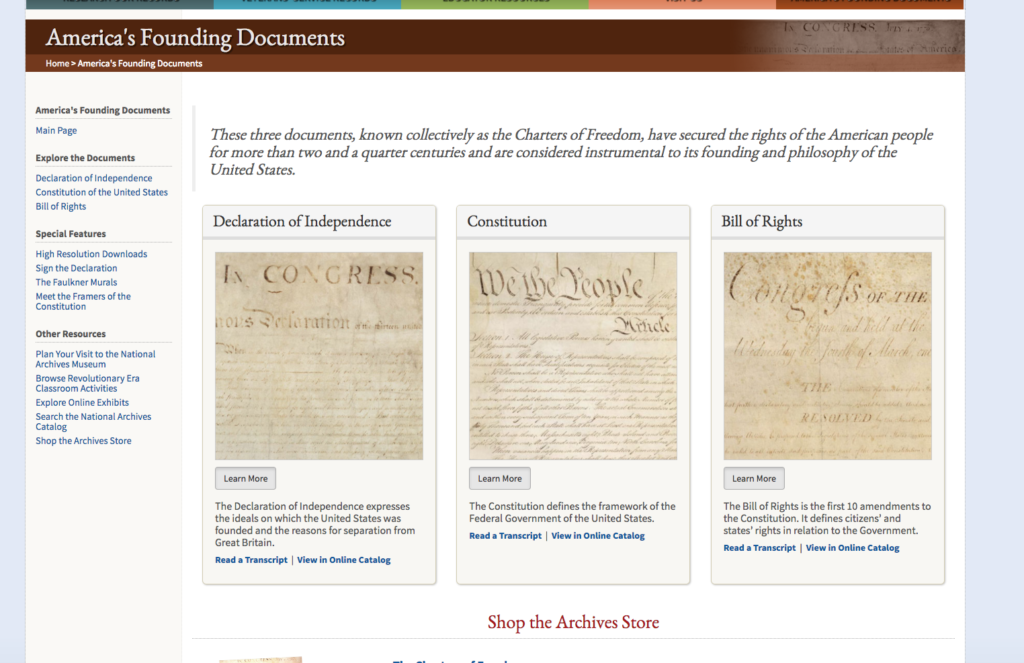
The Articles of Confederation is conspicuously absent from the page.[2] In fact, it isn't even a sidebar or bottom-page link away. In this digital representation of "America's Founding Documents," the Articles of Confederation doesn't exist.
The National Archives houses the original, signed copy of the Articles of Confederation. But to find its digital copy, you have to search for it. And the first link you will find, "Welcome to OurDocuments.gov," takes you to a completely different website, which has a far inferior display and web view for documents compared to the Archives' "America's Founding Documents" page.[3]
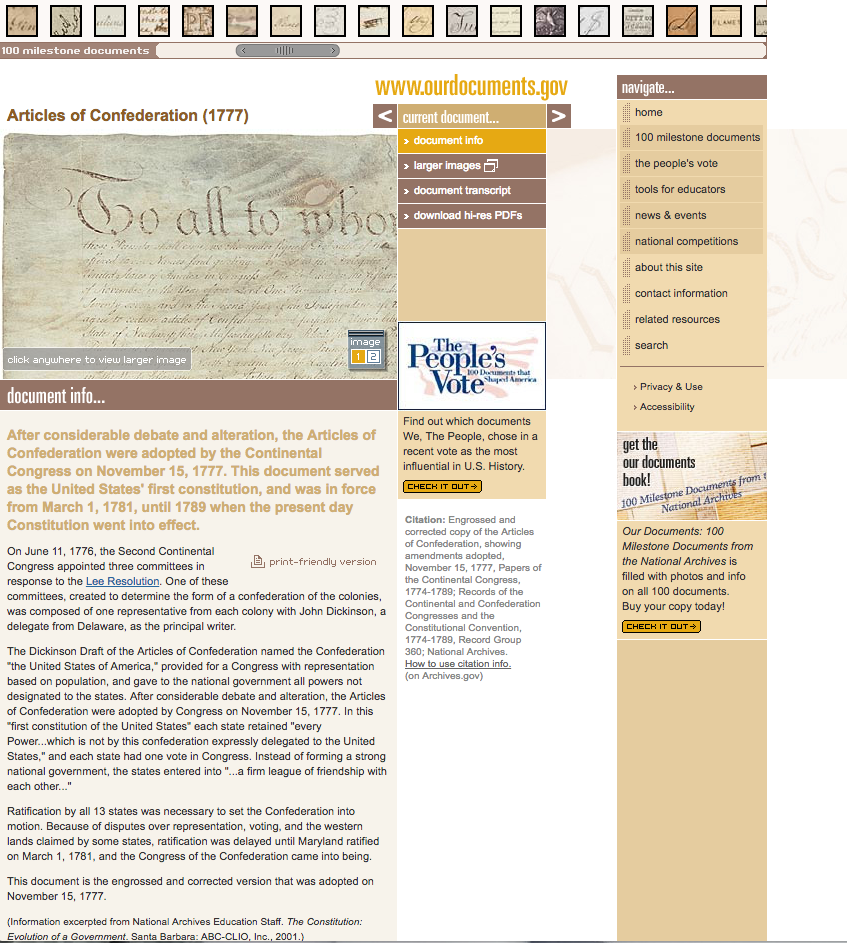
Archives and History
Archives shape the way we view and interpret history. It's something Jennifer Morgan and Peter Drummey reminded me of during our conversations for the "Doing History: How Historians Work" podcast series and something Karin Wulf talks about in her tweets and blog posts.
The National Archives plays a large role in how we view our nation's written record and what we view as historically important in that record. According to its interpretation, the Articles of Confederation is not a significant document. Therefore the document is hard to find on the National Archives' website--a casual browser would not find it--and the Archives has omitted it from the digital pantheon it created to highlight "America's Founding Documents."[4]
Of course, I disagree with the National Archives.
The Articles of Confederation is one of "America's Founding Documents." In fact, it shares the same lineage as the three documents the National Archives includes within its "Charters of Freedom."
The "America's Founding Documents" Family Tree
The Second Continental Congress agreed to draft articles of confederation on the same day it moved to draft a declaration to declare the colonies' independence from Great Britain.[5]
The fact that the Articles of Confederation placed too much sovereignty in the states caused the Constitutional Convention to convene and draft a new constitution in 1787. The Articles of Confederation directly informed the Constitution of 1787.
The Articles of Confederation also informed Madison's Bill of Rights. For example, Article 2 of the Articles of Confederation states that "Each State retains its sovereignty, freedom, and independence, and every power, jurisdiction, and right, which is not by this confederation expressly delegated to the United States, in Congress assembled."[6]
Amendment X of the Bill of Rights: "The powers not delegated to the United States by the Constitution, nor prohibited by it to the States, are reserved to the States respectively, or to the people."[7]
Project Direction
The ultimate goal of my research into the drafting and ratification of the Articles of Confederation is to produce a multimedia/multi-platform book. In the poetic words of Robert Frost, I have "miles to go before I sleep/And miles to go before I sleep"; I am years away from realizing this goal.[8]
One of the mistakes I made with my dissertation was I waited too long to start writing. Therefore, I'm thinking about writing an article. I have so much research to conduct for this project. Pursuing an article would both direct the directions I go in my research and ensure that I start writing sooner rather than later.
I have two article projects in mind. One article would explore the omission of the Articles of Confederation from histories of the American Revolution. I imagine the article would investigate the early histories of the American Revolution, why the Articles do not fit neatly within those nationalist interpretations of American history, and how the historiography of the Revolution has rarely looked back at the Articles since those early histories.
The second article would be to explore the settlement of the boundary between New York and Massachusetts. The article would explore issues over western land, cultural differences, and how Article 9 of the Articles of Confederation operated. I've wanted to write this article since grad school and I already have a fair amount of the research for it in my files. But I'm not sure I should write it. The article would deal with issues that affected the drafting and ratification of the Articles of Confederation, but it's not a piece I see fitting within a multimedia/multi-platform book focused on how the Second Continental Congress drafted and ratified the Articles.
Notes
[1] Alan Taylor's American Revolutions: A Continental History, 1750-1804, is one place I expected to find the Articles of Confederation mentioned and it appeared. Taylor devoted three pages (pages 337-339) to summarizing the Articles and the challenges the Second Congress experienced in drafting and ratifying them.
[2] The Articles of Confederation are also absent from the National Archives online gift shop. For the record, I would purchase a facsimile of the Articles to hang on my wall if one existed.
[3] A bit more searching and you will find the National Archives' wonderful high-resolution images of the signed copy of the Articles of Confederation.
[4] The National Archives also omits the Articles of Confederation from its physical pantheon to the United States' founding documents: the Rotunda for the Charters of Freedom.
[5] Richard Henry Lee's Resolution, June 7, 1776.
[6] It's important to note the importance of Article 2. It appears after Article 1, which states "The Stile of this confederacy shall be, "The United States of America." Transcript of the Articles of Confederation, OurDocuments.Gov.
[7] U.S. National Archives, "The Bill of Rights: A Transcription."
[8] Robert Frost, "Stopping by Woods on a Snowy Evening"
Why the Omission? Exploring the Articles of Confederation in Early Histories of the Revolution
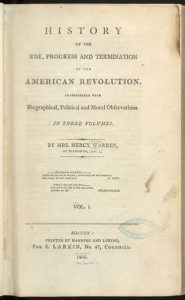 I've been digging into the earliest histories of the American Revolution. Specifically David Ramsay's The History of the American Revolution in Two Volumes (1789) and Mercy Otis Warren's The Rise, Progress, and Termination of the American Revolution (1805).
Ramsay's history contains 667 pages, Warren's history 700 pages.[1] In all of those pages, Ramsay devotes almost two pages to the Articles of Confederation, Warren a single, short paragraph.[2]
I've been digging into the earliest histories of the American Revolution. Specifically David Ramsay's The History of the American Revolution in Two Volumes (1789) and Mercy Otis Warren's The Rise, Progress, and Termination of the American Revolution (1805).
Ramsay's history contains 667 pages, Warren's history 700 pages.[1] In all of those pages, Ramsay devotes almost two pages to the Articles of Confederation, Warren a single, short paragraph.[2]
What does it mean that the first historians of the American Revolution--a man and woman who lived through and experienced the event--devoted so little time and space to the United States' first constitution?
In fairness to Ramsay, he does summarize why the Second Continental Congress drafted the Articles of Confederation: "the act of independence did not hold out to the world thirteen sovereign states, but a common sovereignty of the whole in their united capacity. It therefore became necessary to run the line of distinction, between the local legislatures, and the assembly of the states in Congress." (332) He also reflects on the powers granted to the "assembly of states in Congress" by the Articles of Confederation.
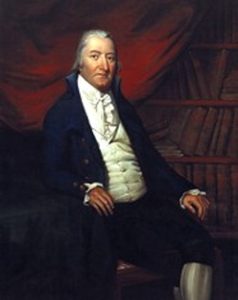
As Ramsay recounts the powers the Articles of Confederation granted to the new national congress, he also reflects on why aspects of the confederation government proved weak: The new government did not have the power to regulate trade because Americans had so little experience trading with foreign powers on their own; the framers of the Articles didn't know they needed the power to regulate trade. The confederation government lacked a "power of compulsion" [power to tax] on the states because "the system of federal government was...more calculated for what men then were, under these circumstances, than for the languid years of peace, when selfishness urusped the place of public spirit, and when credit no longer assisted, in providing for the exigencies of government." (333)
Ramsay may have included the Articles of Confederation in his history, but his account is short and it doesn't attempt to describe the debate, conflict, and compromise that informed the drafting and ratification of the Articles of Confederation.
Why do these early histories lack details about the Articles of Confederation and how they came to be?
I can think of some possibilities:
Both Ramsay and Warren relied on the papers and correspondence of friends as source material for their histories. Did they largely omit the drafting and ratification of the nation's first government from their histories because their friends and correspondents weren't those who had participated in the drafting and ratification of the Articles? It's a possibility, but one I don't think will turn out to be the case.
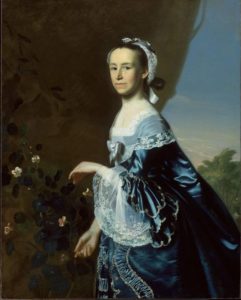
Could it be that the absence of the Articles of Confederation in these histories speaks to the fact that there was so much going on with the War for Independence that Americans were too distracted to care or notice the ratification of their first national constitution on March 1, 1781? This could be true, in part. I know from my work on the Revolution in Albany that on the ground most people were more concerned with survival than with the activities of a faraway congress.
Or perhaps the reason why Warren and Ramsay devoted so little time and space to the Articles of Confederation is that both published their histories with nationalistic goals and after the ratification of the Constitution of 1787. In fact, Ramsay purposely waited to publish his history until after the states had ratified the Constitution.
Ratification of the Constitution complicated the history of the Articles of Confederation, especially for the nation's first historians. Both Warren and Ramsay's histories feature chronological accounts of the Revolution. Their histories read as "this event happened and then this event happened and then this event happened" with splashes of commentary thrown in.
Both historians strove to use early American history as a way to unite the new nation. They recognized that Americans needed to form an identity apart from Great Britain and British traditions. They attempted to unify their fellow Americans by writing histories that the new nation could be proud of. Sure the United States failed throughout the course of the American Revolution, but Americans learned from their mistakes and overcame the odds to secure their independence. These histories have political and moral points and these points are supposed to be uplifting.
As Ramsay's brief attempt to incorporate the Articles of Confederation into his history demonstrates, the Articles don't fit neatly within the framework of these early nationalist histories. The story of the Articles highlights conflict and dissension. States and regions argued over whether the state or national government should have supreme sovereignty; how lands should be divided and governed; how citizens and states should be taxed. It took three years, lots of compromise, and the threat of a British invasion of Maryland for the states to unanimously ratify the Articles and put the constitution into effect.
In 1805, the story of the Articles was ill-timed. It contained too much discord to recount at a time when Americans were still trying to unite behind the Constitution of 1787. No one yet knew if the Constitution of 1787 would persist and whether the United States would survive as an independent country. This uncertainty would have made it difficult for these nationalist historians to grapple with the history of the Articles of Confederation.
Regardless of why Ramsay and Warren largely omitted the Articles of Confederation from their histories, the fact that they largely left the constitution out of their histories leaves me to wonder if it's their omission that has caused it to be absent from so many subsequent histories of the American Revolution and early United States.
Notes
[1] Warren, Mercy Otis. The History of the Rise, Progress, and Termination of the American Revolution. Edited by Lester H. Cohen. 2 vols. Indianapolis: Liberty Classics, 1988; Ramsay, David. The History of the American Revolution in Two Volumes. Edited by Lester H. Cohen. 2 vols. Indianapolis: Liberty Classics, 1990.
[2] If you're curious, Warren had this to say about the Articles of Confederation in her one paragraph: "A solemn confederation, consisting of a number of articles by which the United States should in future be governed, had been drafted, discussed, and unanimously signed by all the delegates in congress, in the month of October, one thousand seven hundred and seventy-six. This instrument was sent to each legislature in the thirteen states, and approved and afterwards ratified by the individual governments. After this, the congress of the United States thought proper to appoint commissioners to the court of France, when fortunately a loan of money was negociated [sic] on the faith of the United States, and permission obtained for the reception of American ships of war, and the sale of prizes that might be captured by them, and carried into any of the ports of France." pg 198. Note that Warren gave the wrong date. Congress signed the Articles of Confederation and sent them out to the state legislatures in November 1777, not October 1776.

